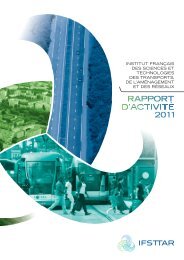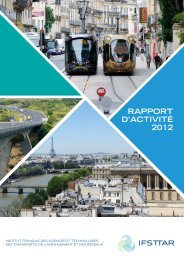french institute of science and technology for transport ... - Ifsttar
french institute of science and technology for transport ... - Ifsttar
french institute of science and technology for transport ... - Ifsttar
Create successful ePaper yourself
Turn your PDF publications into a flip-book with our unique Google optimized e-Paper software.
Research orientation 1_Mobility, the environment <strong>and</strong> energy<br />
How households are adapting<br />
to rising fuel prices<br />
The considerable rises in fuel prices since the beginning<br />
<strong>of</strong> the years 2000 have prompted more in-depth analysis<br />
<strong>of</strong> the (variable) impacts this has had on household car<br />
ownership <strong>and</strong> use.<br />
A CERTU study on travel in the period 2000-2010 summarizes<br />
the research started at INRETS in 2009 <strong>and</strong> completed<br />
in 2011 into the way households adapted to fuel price rises<br />
during the period 1999-2008. The research team has also<br />
investigated the specific impact <strong>of</strong> price volatility.<br />
What has emerged is that these price rises have led to a substantial<br />
reduction in the distances travelled by car. As a consequence,<br />
although the number <strong>of</strong> cars continues to increase,<br />
overall traffic levels in France have remained constant since<br />
2005. Another long-term effect is that vehicle manufacturers<br />
<strong>and</strong> consumers are tending to favour more economical models,<br />
particularly diesel. The price sensitivity <strong>of</strong> households to fuel<br />
prices is greater when the rise lasts <strong>for</strong> some time (after 2004)<br />
<strong>and</strong> when prices are volatile (the large increase in mid-2008<br />
which was followed by a collapse).<br />
Apart from this overall impact, when households are monitored<br />
over a several years, certain vulnerable groups st<strong>and</strong> out: the<br />
poorest individuals <strong>and</strong> those who live in the least dense zones<br />
cannot reduce their mileages because they have no alternative.<br />
A sudden price rise like the one in 2008 (when almost half <strong>of</strong> all<br />
motorists reported driving less) amplifies these impacts: some<br />
individuals, who were thought to be incapable <strong>of</strong> reducing<br />
their mileages, still manage to restrict their car use even more<br />
drastically. But how? Gaining a clearer picture <strong>of</strong> these groups<br />
<strong>and</strong> how their behaviours change would allow us to design<br />
compensatory social measures (fuel cheques, re-evaluation<br />
<strong>of</strong> the per-kilometre tax deduction, etc.) that target them. All<br />
topics that are worth studying…<br />
160<br />
150<br />
140<br />
Fuel prices between 01/1999 <strong>and</strong> 12/2011<br />
(“DIREM” series, constant Euro – end 2011 – per hectolitre)<br />
130<br />
120<br />
110<br />
100<br />
90<br />
80<br />
70<br />
Gazole<br />
Super SP95<br />
60<br />
01/01/99 31/12/00 31/12/02 30/12/04 30/12/06 29/12/08 29/12/10<br />
43<br />
@ CONTACT<br />
laurent.hivert@ifsttar.fr<br />
Storing energy in hybrid vehicles<br />
Accelerated ageing<br />
IFSTTAR played an active role in the Simstock project<br />
which was completed in 2011 <strong>and</strong> financed by ADEME<br />
to the tune <strong>of</strong> €2M. For three years, the 15 project partners<br />
from industry <strong>and</strong> academia mounted a large-scale<br />
experimental operation <strong>and</strong> developed joint protocols<br />
<strong>and</strong> a common methodology to investigate the ageing<br />
<strong>of</strong> the batteries <strong>and</strong> supercondensers used in hybrid<br />
vehicles.<br />
A great deal is at stake here, as if these vehicles are to<br />
become acceptable <strong>and</strong> widely used we must improve <strong>for</strong>ecasting<br />
<strong>of</strong> the per<strong>for</strong>mance <strong>and</strong> lifetime <strong>of</strong> the on-board energy<br />
storage systems used in these complex technologies.<br />
Accelerated ageing tests were conducted <strong>for</strong> us to develop ageing<br />
models <strong>and</strong> build up a large database on the ageing <strong>of</strong> the<br />
batteries <strong>and</strong> supercondensers under experimental conditions<br />
which although simplified are nevertheless representative <strong>of</strong><br />
use in a hybrid vehicle. The influence <strong>of</strong> utilization parameters<br />
(temperature, current amplitude, exchanged<br />
charge <strong>and</strong> variations in state <strong>of</strong> charge) has<br />
been demonstrated <strong>and</strong> led to the development<br />
<strong>of</strong> ageing models which have the potential to<br />
be implemented in energy simulation tools <strong>for</strong><br />
vehicles.<br />
The project partners are planning to continue<br />
their research by extending it to cover real loading<br />
conditions (real current pr<strong>of</strong>iles, rest periods <strong>and</strong><br />
temperature variations). Studies <strong>of</strong> battery ageing are<br />
faced by the rapid development <strong>of</strong> technologies which are<br />
not yet industrially mature <strong>and</strong> the complexity <strong>of</strong> the mechanisms<br />
that are at work during real use. In addition, it is not possible<br />
to extrapolate directly to the conditions <strong>of</strong> “electric vehicle”<br />
or “hybrid vehicle” use. Plenty <strong>of</strong> work remains to be done!<br />
@ CONTACT<br />
gerard.coquery@ifsttar.fr & serge.pelissier@ifsttar.fr<br />
Battery cell<br />
<strong>for</strong> vehicle<br />
applications.<br />
ANNUAL REPORT 2011 ifsttar.fr






![Trajectoire le magazine n°3 - Juillet 2012 [.pdf] - Ifsttar](https://img.yumpu.com/30038493/1/190x253/trajectoire-le-magazine-na3-juillet-2012-pdf-ifsttar.jpg?quality=85)

